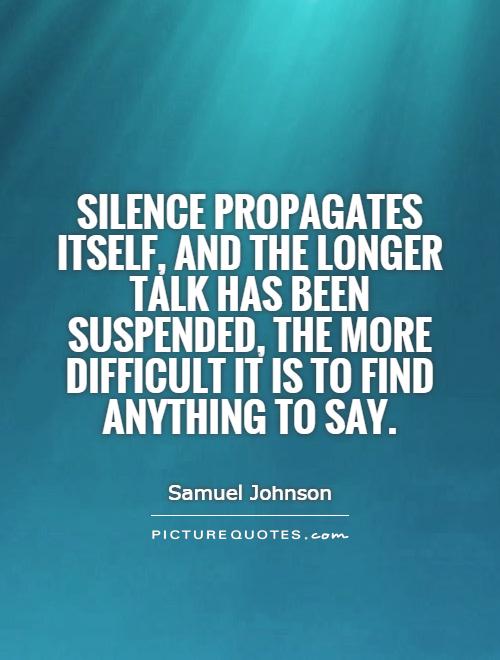Silence propagates itself, and the longer talk has been suspended, the more difficult it is to find anything to say

Silence propagates itself, and the longer talk has been suspended, the more difficult it is to find anything to say
Samuel Johnson, the renowned English writer, once famously said, "Silence propagates itself, and the longer talk has been suspended, the more difficult it is to find anything to say." This statement holds a profound truth that resonates with many aspects of human communication and interaction.Johnson's observation about the nature of silence and conversation highlights the delicate balance between speaking and listening. In a world where constant communication and noise often dominate our lives, the value of silence is often overlooked. However, Johnson reminds us that silence is not merely the absence of sound, but a powerful force that can shape the dynamics of a conversation.
When talk has been suspended for a prolonged period, the silence that ensues can create a sense of unease and discomfort. People may struggle to find the right words to break the silence and restart the conversation. This phenomenon is known as conversational lag, where the longer the silence persists, the harder it becomes to find anything meaningful to say.
In the context of Samuel Johnson's own life and work, his keen understanding of the power of words and the art of conversation is evident in his writings and conversations. Johnson was known for his wit, intelligence, and eloquence, and he often used his words to engage and provoke thought in his readers and listeners.
Johnson's quote also speaks to the importance of active listening in communication. By listening attentively to others, we can better understand their perspectives and respond thoughtfully, rather than simply filling the silence with empty words. In a world where communication is often rushed and superficial, Johnson's words serve as a reminder to pause, listen, and choose our words carefully.












 Friendship Quotes
Friendship Quotes Love Quotes
Love Quotes Life Quotes
Life Quotes Funny Quotes
Funny Quotes Motivational Quotes
Motivational Quotes Inspirational Quotes
Inspirational Quotes